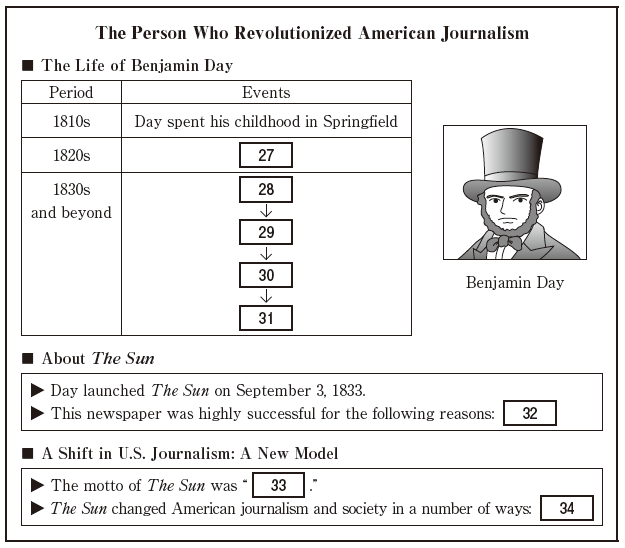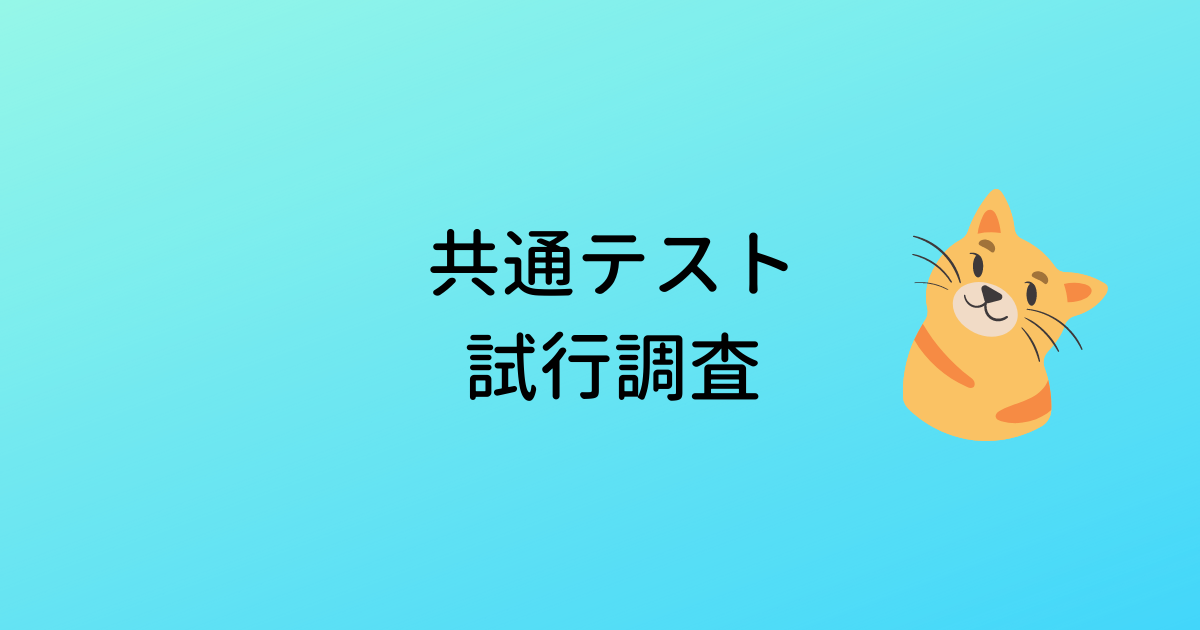Your group is preparing a poster presentation entitled “The Person Who Revolutionized American Journalism,” using information from the magazine article below.
In 1833, there were 650 weekly and 65 daily American newspapers, with average sales of around 1,200. Although there were cheap newspapers in other parts of the country, in New York a newspaper usually cost as much as six cents. Day believed that many working-class people were able to read newspapers, but chose not to buy them because they did not address their interests and were too expensive. On September 3, 1833, Day launched The Sun with a copy costing just one cent. The introduction of the “penny press,” as cheap newspapers became known, was an important milestone in American journalism history.
Day’s newspaper articles were different from those of other newspapers at the time. Instead of reporting on politics and reviews of books or the theater, The Sun focused on people’s everyday lives. It was the first newspaper to report personal events and crimes. It led to a paradigm shift in American journalism, with newspapers becoming an important part of the community and the lives of the readers. Day also came up with another novel idea: newsboys selling the newspaper on street corners. People wouldn’t even have to step into a shop to buy a paper.
The combination of a newspaper that was cheap as well as being easily available was successful, and soon Day was making a good living publishing The Sun. Within six months, The Sun’s circulation reached 5,000, and after a year, it had risen to 10,000. By 1835, sales of The Sun had reached 19,000, more than any of the other daily papers at that time. Over the next few years, about a dozen new penny papers were established, beginning a new era of newspaper competition. The success of The Sun encouraged other journalists to publish newspapers at a lower price. By the time of the Civil War, the standard price of a New York City newspaper had fallen to just two cents.
Despite his success, after about five years of operating The Sun, Day lost interest in the daily work of publishing a newspaper. In 1838, he sold The Sun to his brother-in-law, Moses Yale Beach, for $40,000, and the newspaper continued to publish for many years. After selling the paper, Day moved into other business areas, including the publication of magazines, but by the 1860s he was basically retired. He lived quietly until his death on December 21, 1889. Although he had been involved in the American newspaper business for a relatively short time, Day is remembered as a revolutionary figure who showed that newspapers could appeal to a mass audience.

問1 Members of your group listed important events in Day’s life. Put the events into the boxes ( 27 )~( 28 ) in the order that they happened.
1. Day created other publications
2. Day established a printing company
3. Day gained experience as a printer in his local area
4. Day started a newspaper business
5. Day’s business was threatened by a deadly disease
問2 Choose the best statement(s) to complete the poster. (You may choose more than one option.)
1. Day focused on improving the literacy levels of the working class.
2. Day introduced a new way of distributing newspapers.
3. Day realized the potential demand for an affordable newspaper.
4. Day reported political affairs in a way that was easy to understand.
5. Day supplied a large number of newspapers to every household.
6. Day understood what kind of articles would attract readers.
問3 Which of the following was most likely to have been The Sun’s motto?
1. Nothing is more valuable than politics
2. The daily diary of the American Dream
3. The Sun: It shines for all
4. Top people take The Sun
問4 Choose the best statement(s) to complete the poster. (You may choose more than one option.)
1. Information became widely available to ordinary people.
2. Journalists became more conscious of political concerns.
3. Journalists started to write more on topics of interest to the community.
4. Newspapers became less popular with middle-class readers.
5. Newspapers replaced schools in providing literacy education.
6. The role of newspapers became much more important than before.
解答のポイント
下のポスターの ( ) に入る言葉を選ぶ問題です。長文問題は本文を読むより先に、設問に目を通すのがポイントですが、今回の問題は ( ) に関係するポスターの部分を先に目を通しておくと、本文の何に注意すればよいかが分かりやすいです。
・( 27 )~( 28 ) は時系列通りに並び替える問題です。( 27 ) だけが 1820s なので、そこはすぐに埋まりそうですね。
・( 32 ) は ( ) を含む文を、先に見ておきましょう。
「この新聞は次の理由で大成功しました」
ということで、新聞成功の理由を本文から探せばよいですね。
・( 33 ) も ( ) を含む文を、先に見ておきます。
「The Sun のモットー ( ) でした」
The Sun というのはおそらく新聞の名前ですね。それのモットーを本文から探せばよいです。
・( 34 ) も ( ) を含む文を、先に見ておきます。
「The Sun はアメリカのジャーナリズムと社会を様々な方法で変えた。( )」
どういう方法で変えたのかを、本文から探せばよいです。
【解説】問1 正解率 21.7%
問題問1 Members of your group listed important events in Day’s life. Put the events into the boxes ( 27 )~( 28 ) in the order that they happened.
1820s の数字は直接本文にはありません。しかし 1810 と1831 がありますので、その間に書かれてあることが 1820s と想像できます。
「彼はティーンエイジャーのとき印刷工に仕えました」
ということで、最初は「3」になります。
3. Day gained experience as a printer in his local area
「Day は地方で printer として経験を積んだ」
「1831年に、十分なお金をためて、彼は彼自身の印刷事業を始めました」
ということで、次は「2」です。
2. Day established a printing company
「Day は印刷会社を設立した」
「翌年コレラの流行が町を襲ったとき、それ(会社)は懸命に努力し始めました」
ということで、次は「5」です。
5. Day’s business was threatened by a deadly disease
「Day のビジネスは致命的な病気によって脅かされました」
a cholera epidemic = a deadly disease に気づければ、大丈夫ですね。
「彼のビジネスが破綻することから防ぐ試みで、Day は新聞を始めることを決めました」
・In an attempt to ~ / する試みで
・prevent A from B / AからBを防ぐ
・go under / 沈む、落ちぶれる、失敗する
ということで次は「4」です。
4. Day started a newspaper business
「Day は新聞ビジネスを始めた」
ここまでできれば、残りは「1」となります。
1. Day created other publications
「Day は別の出版物を作った」
ではその「1」の内容はどこに書いてあるのでしょう? 実は本文の最後の段落にあります。
「Day は雑誌の出版を含む、他のビジネス分野に移動した」
ということで正解は 3 → 2 → 5 → 4 → 1 の順番になります。
【解説】問2 正解率 8.7%
問題問2 Choose the best statement(s) to complete the poster. (You may choose more than one option.)
2. Day introduced a new way of distributing newspapers.
「新聞を配布する新しい方法を導入した」
3. Day realized the potential demand for an affordable newspaper.
「手頃な価格の新聞への潜在的な需要を実現しました。」
「affordable / 手頃な」は「afford / 買う余裕がある」の派生語です。affordable の単語が分からなくて、この選択肢を選べなかった人が多かったのではないかと、分析に書かれています。
afford 自体は英検準二級レベルなので、知っているべき単語です。そこから推測することができるかどうかですね。
「私たちは車を買う余裕がない」
選択肢2. 3. については、本文の第四段落の最初に書いてあります。
「安くて、入手しやすいという新聞の組み合わせが成功した」
6. Day understood what kind of articles would attract readers.
「どんな種類の記事が読者を引きつけるかを理解しました」
第二段落にこうあります。
「多くの労働者階級の人々は新聞を読むことができると信じていたが、それら (新聞) は彼らの興味に対処せず、高すぎるため、それらを購入しないことを選択した」
そして第三段落にこうあります。
「The Sun は、人々の日常生活に焦点を当てました。それは個人的な出来事や犯罪を報道した最初の新聞でした」
1. Day focused on improving the literacy levels of the working class.
「労働者階級の、識字率の向上に焦点を当てた」
Day は、多くの労働者階級の人々は新聞を読むことができる、と信じていましたから、これは違います。
4. Day reported political affairs in a way that was easy to understand.
「わかりやすい方法で政治問題をレポートした」
政治問題ではなく、人々の日常生活に焦点を当てたのです。
5. Day supplied a large number of newspapers to every household.
「すべての世帯に大量の新聞を提供しました」
街角で新聞配達に新聞を売らせたので違いますね。
ということで、正解は「2.3.6」です。
これは本文の第二段落で「安い」と「手に入れやすい」、第三段落で「安い」と「興味に合わせている」のように、The Sun の成功した理由が書かれてあります。
二つの場所でそれぞれ二つずつ、理由が書かれているのですね。そしてそのうち一つの理由 (安い) が被っているわけです。いやらしいですね。
【解説】問3 正解率 40.4%
問題問3 Which of the following was most likely to have been The Sun’s motto?
1. Nothing is more valuable than politics
「政治ほど価値あるものはない」
人々の日常生活に焦点を当てたのですから、これは違います。
2. The daily diary of the American Dream
「アメリカンドリームの日記」
Day 自身がアメリカンドリームをつかんだかもしれませんが、それと新聞のモットーとは関係ありませんよね。
4. Top people take The Sun
「トップの人が The Sun を取る」
労働者階級に向けてのものでもあったのですから、これは違いますね。
3. The Sun: It shines for all
「The Sun: それはすべてを照らす」
このモットーは、直接本文に書かれてありません。しかし、それまでお金持ち向けのものだった新聞を、労働者階級の人にも買えるようにしたり、扱う内容もそれまでの特定分野ではなく、personal events and crimes と幅広いのですから、この選択肢が正解になると考えられます。
ということで、正解は「3」です。
【解説】問4 正解率 19.2%
問題問4 Choose the best statement(s) to complete the poster. (You may choose more than one option.)
2. Journalists became more conscious of political concerns.
「ジャーナリストは政治的関心をより意識するようになった」
political concerns ではなく、people’s everyday lives ですので、ダメです。
4. Newspapers became less popular with middle-class readers.
「新聞は中流階級の読者にあまり人気がなくなった」
逆に人気になりましたね。なのでこれもダメです。
5. Newspapers replaced schools in providing literacy education.
「新聞は識字教育の提供において、学校に取って代わった」
もともと多くの労働者階級の人々は新聞を読むことができる、と言っていましたので、これもダメです。
1. Information became widely available to ordinary people.
「情報が一般の人々に広く利用可能になりました」
安くて入手しやすいという新聞の組み合わせが成功した、とありましたね。
3. Journalists started to write more on topics of interest to the community.
「ジャーナリストは、社会が関心を持つ話題についてさらに書き始めました」
第三段落にこうあります。
「それ (個人的な出来事や事件をニュースにのせること) はアメリカのジャーナリズムにパラダイムシフトをもたらした」
6. The role of newspapers became much more important than before.
「新聞の役割は以前よりはるかに重要になりました」
本文の最後にこうあります。
新聞は多くの聴衆にアピールできる
ということで、正解は「1.3.6」です。
問2と問4は正解がいくつあるのかわかりません。したがって、消去法だけで解くことができません。その点で正解率が低くなっているのでしょう。



コメントをどうぞ